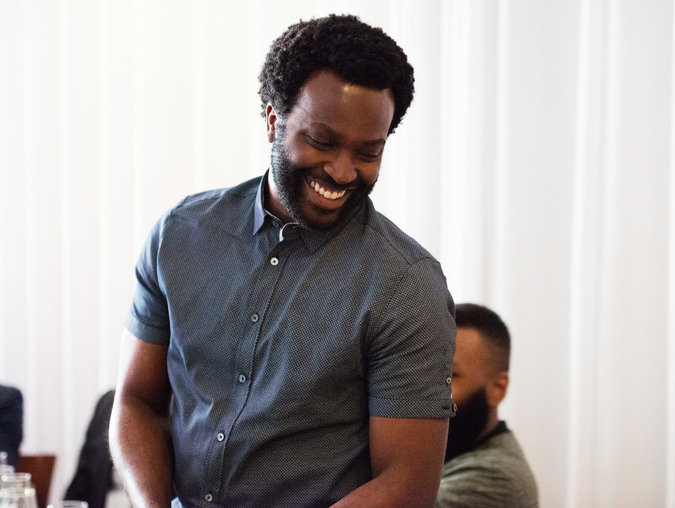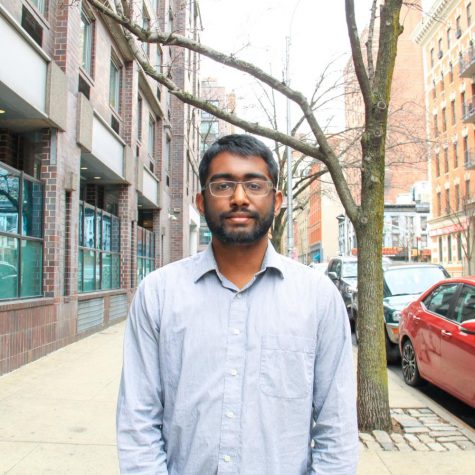Starting high school ushers in all sorts of excitement and anxiety. But imagine looking forward to your first year of high school and then being told by your parents you would be living the first two years of it in Nigeria. It’s hard to imagine, but that was the case for former Tisch grad student Faraday Okoro, whose debut feature film, the semi-autobiographical “Nigerian Prince,” opened in theaters this past Friday.
Okoro is the inaugural winner of the AT&T and Tribeca Film Institute’s “Untold Stories” prize, a $1 million production grant intended to support underrepresented filmmakers in making their first film. He won the award in 2017, but “Nigerian Prince” made its debut at the 2018 Tribeca Film Festival.
The film, executive produced by Academy Award winner and NYU alumnus Spike Lee, follows first-generation Nigerian-American Eze (Antonio J. Bell) who is forced to go to Nigeria and then teams up with his scammer cousin Pius (Chinaza Uche) to trick unsuspecting foreigners into giving him money for a ticket back to the United States.
During his time living in West Africa, Okoro had limited exposure to media because of frequent power outages. One day while the power was on, Okoro stumbled upon a movie that transformed his understanding of cinema and flooded his heart with an undying love for the art form.
“The film ‘Road to Perdition’ was playing and I was just glued,” Okoro said. “I never watched a film as mature as that until then. The power stayed on for 20 minutes and then it turned out. But I was glued on.”
Okoro completed his undergraduate education at Howard University, making short films during his time there. He was first inspired to create “Nigerian Prince” while sitting in a computer lab during his senior year. By that time, he had decided to attend the Tisch School of the Arts for graduate school.
“I think I decided to go to NYU because of its conservatory-style hands-on learning,” Okoro said. “There’s not necessarily many film schools that allow you to learn by doing, but we make a number of films, and by the time you leave the grad program you could probably make four to five short films … There’s a lot of support, we’re all learning together.”
The relationships Okoro forged while at Tisch have certainly benefited him. A producer, the director of photography, the costume designer and production designer on “Nigerian Prince” were all classmates of Okoro’s. Okoro recalls how he and cinematographer Sheldon Chau would often take the time to simply look at each other in between shots to remind themselves they had each other’s back.
Perhaps the most important relationship Okoro forged at Tisch was with Lee. Okoro elaborated on Lee’s involvement in the project.
“It was great. He offered a lot of attention and support during the development of the project,” Okoro said. “After I got the funding he was off doing his own thing, and after I came back he watched the footage, he gave me ideas for editing. [It’s] something I’ll always treasure.”
The story of “Nigerian Prince” mirrors some of Okoro’s own experiences — and he deliberately leaned on his past to help add authenticity to the film.
“Maybe it’s a personal thing but I was not afraid to go as deep as I could,” Okoro said. “The idea of doing a film about scammers in Nigeria [was something I never heard of]. For a Western audience it would have been difficult for characters who speak a different type of English and it was a challenge until I realized I could add some of my experiences in there. It just opened up a lot of possibilities.”
Okoro co-wrote the screenplay with fellow Howard alumnus Andrew Long, but decided to shelf it and instead shoot it for his thesis film.
“Initially it was a $250K budget, and after about two years working on the script I then went into development,” Okoro said.
Okoro had initially applied to Tribeca Film Festival’s All Access grant, which gives seven scripted filmmakers and seven documentary filmmakers $10,000 each. However, he was then urged by Tribeca to apply for the “Untold Stories” grant instead.
“I was very hesitant, it seemed too far-fetched,” Okoro recalled. “On the last day I sucked it up and applied. I was one of five finalists. We all pitched the morning of and during lunch they announced the winners. It was definitely surreal, to know that I would receive funding for it, and more than I had previously anticipated.”
When the film premiered at Tribeca this year, the experience was equally as magical for the writer and director.
“It was definitely beyond belief. It kind of felt similar to winning the award, it was so much emotion happening at once,” Okoro said.
Okoro is currently developing some potential scripts, but said it was too early to announce anything specific. However, he spoke about where he sees his career going and what types of projects he wants to work on.
“As an artist, when you’re early in your career there is this thing [that] is gonna define me for however many years,” Okoro said. “I do think I bring something particular to each of my projects, but from the outside looking in other people are attune to what that thing is. I would love to do a lot of different types of films. Whether [it’s] a big Hollywood action blockbuster or indie movie set in apartheid South Africa, or Libya, I wanna do all sorts of stuff. Each of these genres allow me to flex different film muscles.”
With “Nigerian Prince,” Okoro has crafted both a crime drama and a coming-of-age tale. But while it seems like he has completed a journey that started years ago at Howard and persisted through his time at Tisch, his connection to the film traces all the way back to that one day watching “Road to Perdition” in Nigeria. With his feature debut he has come full circle as a filmmaker and, in a sense, accomplished his own coming-of-age.
A version of this article appeared in the Monday, Oct. 22 print edition. Email Guru Ramanathan at [email protected].
























































































































































